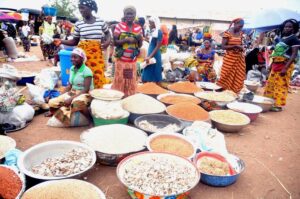A professor of Finance and Capital Market at the Nassarawa State University, Uche Uwaleke, says the rise in commodity prices experienced across Nigeria was expected, but that it would trend down by December.
Reacting to inflation rates which picked at 13.22% according to Consumer Price Index (CPI), which measures prices of goods and services, released by the National Bureau of Statistics (NBS) on Tuesday, Prof Uwaleke stated that the pressure is not unconnected to the effect of the COVID-19 pandemic, security challenges in the country and other fiscal policies of government.
READ ALSO:
Food Price Hikes As Inflation Rate Hits 13.22% Amid VAT Regime, Others
“The uptick in inflation rate in August was expected and will likely continue till the harvest season sets in,” Uwaleke said. “This is particularly so, given the fact that the inflationary pressure is coming more from the food component which increased by as much as 16 per cent.

“ It is not difficult to see where the pressure is coming from. The economy is still reeling from the negative impact of COVID’19 on the food supply chain. This situation is compounded by the border closure, increase in VAT, electricity tariff, stamp duties and upward exchange rate adjustments by the CBN to ease pressure on the market.”
The University don also observed that the recent increase in pump price of fuel presented downside risks to inflation, as well as insecurity.
READ ALSO:
It’s Fake News, There’s No Embankment Collapse at Kainji Dam, Says Commission
“There is also the insecurity challenge affecting the food belts of the country, and this partly explains the high rate of food inflation, at over 20 per cent, in states like Kogi. I expect the inflation rate to moderate towards the end of Q4 2020 in the wake of the harvest season as well as a likely increase in external reserves following gradual recovery in crude oil price, which helps stabilise exchange rate.
“I also think the COVID’19 interventions by government and the CBN, especially in the Agric value chain will begin to manifest in Q4 2020.The way forward to rein in inflation is for government to tackle insecurity so that farmers can return to their farms and put in place deliberate policy to promote large-scale mechanised Agriculture. This will involve scaling up interventions in Agriculture, including recapitalizing of Development Finance institutions like the Bank of Agriculture,” Prof. Uwaleke advised.
